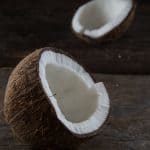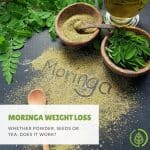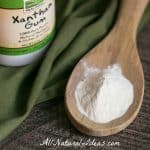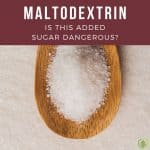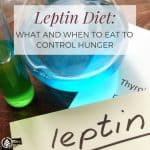When you get sick, do you stay sick? Is your eyesight getting worse? And do you feel weaker, in general? If so, you could have a vitamin E deficiency.
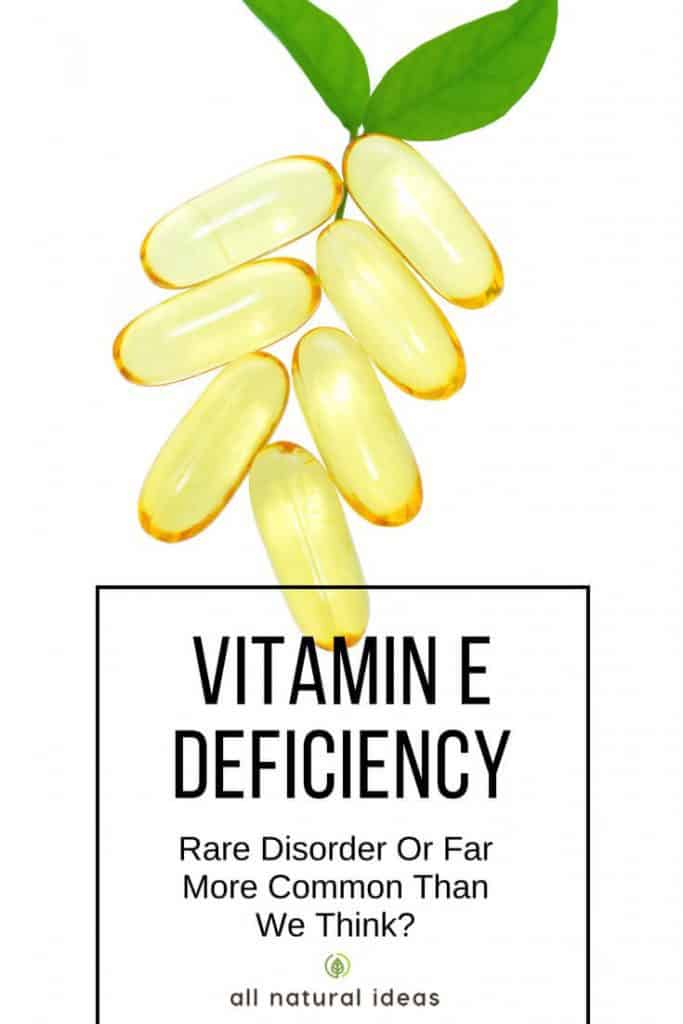
Here’s a fairly easy two-question nutrition quiz….
First question: what’s the common name for vitamin C deficiency?
Answer: scurvy.
Second question: what’s the common name for vitamin D deficiency?
Answer: rickets
If you took a basic nutrition class in middle or high school you likely know the answer to both the above questions.
Now here’s a bonus question:
What is vitamin E deficiency called?
The answer is….
Well, if you already know the clinical name of it, you probably know everything there is to know about the vitamin. You can therefore skip the rest of the article.
However, if you don’t know what abetalipoproteinemia is, keep reading….
Vitamin E: A Powerful Anti-Aging Compound
Many people are aware that vitamin C is an antioxidant. It enjoys folk-remedy status for fighting colds.
Likewise, many people know vitamin D’s nickname: “the sunshine vitamin.”
But as for E, the main thing it’s known for is it’s an ingredient in many skin care and hair remedies.
Besides being good for your skin and hair, vit. E offers several other health benefits.
Most importantly, it’s your body’s primary fat-soluble (meaning, it dissolves in fat) antioxidant.
And here’s in a nutshell how E works. When you eat food, even very healthy leafy greens, it provides you with nutrients and energy.
However, there’s a dark side to food besides the obvious one of weight gain.
You see, even healthy food, breaks down and releases ROS.
ROS stands for ‘reactive oxygen species.’
Don’t worry about ROS. Though it sounds like something out of a horror movie, reactive oxygen species is a normal, everyday occurrence.
ROS are created as part of the normal product of plant cellular metabolism.
If you don’t have ROS living in your body, that means you’re dead.
But when ROS gets out of control, like a proliferation of rowdy party guests, that’s when problems–disease–arise.
There exists a very delicate balance between ROS and their scavengers. And this balance dictates whether or not you will develop chronic disease.
Vitamin E deficiency is a serious health problem because it’s a primary ROS scavenger. It neutralizes oxidative damage which causes death to cells.
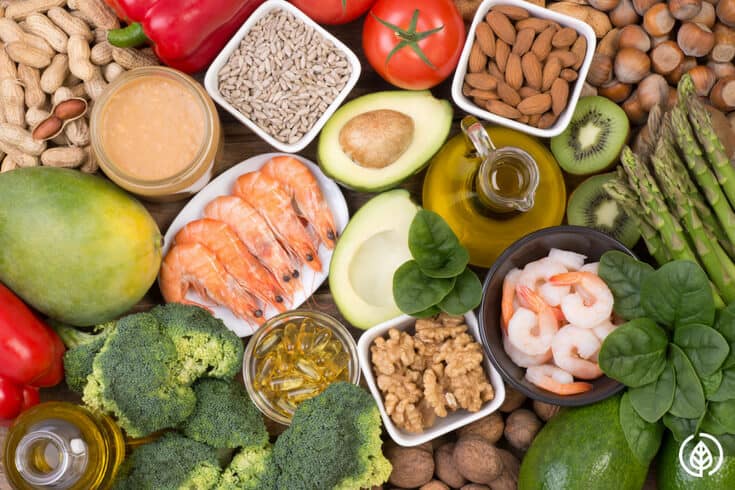
How common is the deficiency?
The good news is the deficiency is very rare in humans. Although you do need to obtain enough E from food, most people get an adequate amount in their diet.
One main reason the condition is thought to be rare is vegetable oils are rich in vitamin E. Most westerners consume lots of processed foods that are made with these oils.
Another source of E are whole grains. Lots of westerners eat cereal, some of which contain whole grains.
Although research studies such as this one claim inadequate intake of this nutrient is rare, there are differing opinions on this.
Maybe some researchers think vitamin E deficiency is more common because vegetable oils are often rancid. And whole grains are processed.
Thus, the potency of this nutrient is significantly weaker.
Wheat germ, avocados, and spinach, and sunflower seeds, and cucamelon are healthy sources of the vitamin.
However, because many people don’t eat these natural foods, perhaps the problem of not getting enough of this nutrient is indeed more common?
What is vitamin E deficiency?
Is saying (or reading) ‘abetalipoproteinemia’ too difficult for you? If so, you can call the health problem “fat digestion disorder.”
Although this is in no way, shape or form a common nickname of the deficiency, it does describe it exactly to a “T.”
You see, people who have the deficiency are not able to break down dietary fat. Most often, this occurs in people who have inherited the condition.
It’s also possible that in some people who can’t digest fats, it’s another disease or condition that’s causing the indigestion.
For example, those with cystic fibrosis (CF) are at greater risk for having vitamin E deficiency. And for this reason, some research studies (like this one) recommend supplementing with this antioxidant if you have CF.
Other people who may have the inability to digest dietary fat are those with short bowel syndrome. In addition, if you have a bile duct obstruction, that can also lead to problems digesting fat.
However, if you eat a mostly healthy diet, you will probably not have a shortage of the nutrient.
And even if you go a few days without eating a spinach salad, no worries. That’s because it’s a fat-soluble nutrient.
This means that it’s stored in your tissues. Great news if you’re doing intermittent fasting or some other form of time-restricted feeding.
But don’t fall off the healthy wagon for too long. Otherwise, you might be at greater risk for vitamin E deficiency.
Health Benefits of vitamin E
In addition to (or because of) the nutrient protecting against cellular damage, here’s how you benefit from it….
Cancer, autoimmune diseases and cataracts can all occur because of ROS proliferation.
(Remember ‘reactive oxygen species’ from above?)
Vitamin E, research shows, protects against these.
In addition, the antioxidant prevents your blood from excessive clotting.
Clotting is great if you have a cut. But you don’t want your blood cells clumping for no reason.
Excessive clotting can lead to atherosclerosis.
Thus, if you have the inability to digest fats or don’t eat enough healthy foods with vitamin E, you may be at greater risk of blood clots.

Symptoms of inadequate intake or absorption
One-third of Americans have some form of metabolic disorder, be it diabetes or obesity (or both.) Those with metabolic disorders may be at higher risk of developing symptoms associated with vitamin E deficiency.
These symptoms include muscle weakness, vision problems (cataracts) and being sick for longer than normal.
Furthermore, neurological difficulties can manifest. In fact, researchers theorize that the deficiency may be one of the root causes of Alzheimer’s disease.
Other central nervous system problems associated with inadequate E intake are tremors and numbness. Balance and walking difficulties, too, can occur.
In addition, the inadequacy of the nutrient may cause the blood disorder, anaemia. Anaemia is a low count of red blood cells.
If you’re freaking out about vitamin E deficiency, start taking one tablespoon of wheat germ oil per day. It provides you with 100% of your daily value.
Consequently, if you get enough of this nutrient, you won’t develop heart disease, go blind or have permanent nerve damage.
These are all potential symptoms of either not getting enough of this antioxidant or not being able to digest fats.
So make sure you’re eating a lot of green leafy veggies and some nuts (almonds are a great source).
In fact, the Cancer Institute of New Jersey says that the nutrient can prevent colon, lung, breast and prostate cancers.
Vitamin E Excess
But is the flip side to vitamin E deficiency a concern? Can you get too much of it?
Perhaps.
This study shows that taking a supplement of it not only offers no benefits to heart health, it may in fact damage it.
“The use of vitamin E was associated with a significantly increased risk of a hemorrhagic stroke in the participants.”
Yikes.
The lesson is you shouldn’t take a vitamin E supplement unless you’re told by a doctor or other health professional to do so.
“High doses of it can interact negatively with medications, including those prescribed to lower cholesterol.”
Vitamin E Toxicity
But if you’re eating an endless bowl of spinach, let’s say, don’t worry about toxicity.
In fact, there’s no evidence of documented toxicity. But this presumably is just from natural dietary sources, not supplements.
High doses of the nutrient in supplement form (greater than 1,000 mg/day) have shown evidence of causing health problems.
One reason it’s important to get vitamin E from healthy foods like wheat germ and sunflower seeds is that the nutrient depends on others to do its thing.
For example, glutathione, the body’s “master antioxidant” helps activate E. So, too, does vitamin C, B3 and selenium.
Vitamin E deficiency symptoms on the skin
Now let’s get back to the most well-known benefit of the nutrient: beauty.
Can a lack of this nutrient manifest as skin problems?
Totally.
Vitamin E is your skin’s first line of defense against UV rays from the sun.
The fat in your skin is particularly at risk of both internal and external damage. And not just from the sun either…..
Air pollution and other chemicals can damage your cell membranes in the skin. And vitamin E comes to the rescue by neutralizing the free radicals that are on the constant warpath.
So eat your spinach salad. Sprinkle a handful of sunflower seeds on it. And get some wheat germ in your diet every now and then.
Your skin will thank you for it.

